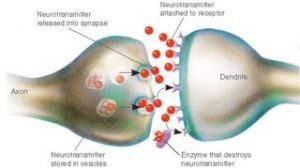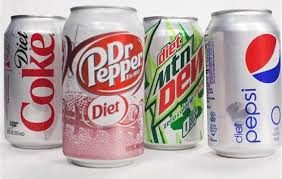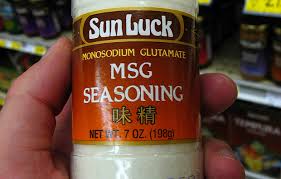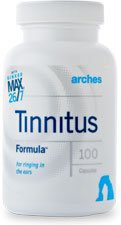By Barry Keate
Barry Keate, has lived with tinnitus over 40 years and has published 150+ research articles on numerous aspects of tinnitus. He is an expert on the condition and a well-known advocate for those with tinnitus.
Editor’s note: This is the fourth in a series of articles on diet and tinnitus: what to eat and what to avoid. Previous articles discussed how insulin resistance and diabetes cause tinnitus; which sugar substitutes to use and which to avoid; and how salt increases blood pressure and tinnitus.
Certain food additives are toxic to the nervous system. These neurotoxins damage nerve cells, or neurons in the brain and the peripheral nervous system. They may cause or worsen diseases and degenerative conditions, including tinnitus. They are found in many popular foods and drinks and may be hidden within other ingredients listed on product labels.
Aspartame and monosodium glutamate (MSG) are neurotoxins. Their destructive effects include damaging the auditory cortex, where sound is processed. A brief overview of neurotransmitters and how they affect the brain will help us understand how this occurs.
How Neurotransmitters Work
Neurotransmitters are chemicals in the brain and nervous system that facilitate the transfer of electrical signals between neurons, or nerve cells. Neurons form large networks throughout the brain, spine and central nervous system. When a neuron receives new information, the it may release a neurotransmitter. These cross the microscopic space, called a synapse, to the next neuron and bind with a receptor there. This may cause either an inhibitory response (reduced electrical activity) or an excitatory response (increased electrical activity) in the second neuron. If the effect is excitatory, that neuron will transmit information to the next neuron.

There are many neurotransmitters in the brain, but the workhorses are GABA (gamma-amino butyric acid) and glutamate. GABA is an inhibitory neurotransmitter and glutamate is an excitatory neurotransmitter. Both types are necessary for proper nervous system operation, and they must be balanced.
Too much GABA, and electrical activity decreases. Benzodiazepine medications like Valium and Klonopin activate GABA in the brain, causing sluggishness, incoherent thinking, and drowsiness.
Too much glutamate, and electrical activity increases. The brain becomes very excitable. This can lead to anxiety, stress, depression, and many neurodegenerative conditions, one of which is tinnitus.
In a previous article we discussed the work of Dr. Abraham Shulman and his colleagues in discovering that deficiency in the GABA receptor is directly responsible for tinnitus. (1) Deficiency in this receptor is responsible for increased amounts of glutamate and excitability in the auditory cortex in the brain. People with tinnitus have elevated levels of glutamate and hyperexcitability in the auditory cortex.
What is Excitotoxicity?
Russell Blaylock, MD, a recently retired professor of neurosurgery at the Medical University of Mississippi, wrote the book, “Excitotoxins: The Taste That Kills”. (2) This reference to taste is due to the fact that both aspartame and MSG are routinely added to processed foods to enhance their taste.
Aspartame is itself an excitatory neurotransmitter, and it is a precursor to another, glutamate. Excesses of these in the nervous system cause neurons to become overly excited and fire too frequently, which raises calcium levels. High calcium levels trigger excessive amounts of free radicals, killing the neurons. The excitatory neurotransmitters excite the neurons to death.
Dr. Blaylock references almost 500 clinical studies that show how excess excitatory neurotransmitters in our food supply are causing serious chronic neurological disorders. Among these conditions are: brain tumors, ADD, Multiple Sclerosis, epilepsy, chronic fatigue syndrome, Parkinson’s and Alzheimer’s disease, Fibromyalgia, hypoglycemia, diabetes, and, of course, tinnitus.
Large numbers of neuronal cells, up to 75% of them, are killed in a particular area of the brain before any clinical symptoms of a chronic illness are noticed. This is the danger of excitotoxicity; it is not noticed until the damage is done.
Aspartame
Aspartame is the key ingredient in the artificial sweeteners NutraSweet, Equal, and Spoonful. It was discovered accidentally, when a chemist for the G.D. Searle Company was testing an anti-ulcer drug. He licked some and noticed it was very sweet. A new product was born. The G.D. Searle Company is now a subsidiary of Pfizer, the pharmaceutical giant.
Clinical studies have called aspartame a “highly hazardous compound”. (3) At high concentrations it causes hyperexcitability of neurons and is a precursor of glutamate, which, in excess, leads to the degeneration and death of neurons.
Aspartame accounts for over 75% of the adverse reactions to food additives reported to the FDA. A few of the 90 different documented symptoms listed are: headaches, dizziness, seizures, nausea, depression, fatigue and hearing loss/tinnitus.
G.D. Searle Company applied for and received FDA approval in 1974 to add aspartame to dry foods. Several months later, approval was put on hold in response to objections filed by neuroscience researchers and consumer advocacy groups. The issue was potentially falsified safety tests.
Six of nine members of the FDA’s Scientific Advisory Board objected to the approval but were overruled by FDA Commissioner Arthur Hull Hayes, Jr. Later, in 1983, the FDA raised the Acceptable Daily Intake measure to allow aspartame’s introduction into the beverages.
Shortly after this second approval, Dr. Hayes left the FDA and became a public relations consultant for the G.D. Searle Company.
In The Huffington Post Dr. Joseph Mercola said, “Aspartame is the most controversial food additive in history. In the end, the artificial sweetener was approved, not on scientific grounds, but rather because of strong political and financial pressure.” (4)
Aspartame can be found in chewing gum, cold breakfast cereals, gelatins, puddings, dairy products, many low calorie prepared foods and, since 1983, in most low-calorie and sugar-free carbonated beverages.

Aspartame also damages insulin sensitivity more than refined sugar and turns off the body’s reaction to signals indicating the stomach is full. This leads to significant weight gain, insulin resistance and diabetes.
Glutamate
Like aspartame, glutamate is an excitatory neurotransmitter. Excess glutamate in the synapse between neurons leads to neuronal death by excitotoxicity.
For thousands of years Japanese cooks have added a special ingredient in their recipes to magnify the desired taste of foods. This ingredient was made from a seaweed called kombu. It was only in the twentieth century that the active ingredient was isolated. This is now known as monosodium glutamate, or MSG.
After World War II, American food processors discovered the flavor-enhancing virtues of MSG and began adding it to processed foods, including baby food. The amounts of MSG added to foods have doubled every decade since the 1940’s until 350,000 metric tons were produced in 2000.
In the 1960s, the term “Chinese Restaurant Syndrome” appeared in the popular vocabulary. This syndrome occurred frequently in people who ate in Chinese restaurants, notorious for their heavy use of MSG. It is characterized by a set of symptoms which include sudden onset of headache, heartburn, palpitations, sweating, swelling a flushing of the face. MSG was beginning to develop a poor reputation, and many people began to attempt to minimize exposure to this food additive.

A loophole in FDA labeling rules allowed manufacturers to use MSG without listing it on the label. It must be listed only when it is added in its free form. If it is combined with other compounds, it does not have to be labeled separately.
This rule led to the development of compounds that contain high levels of MSG but are called something else, such as hydrolyzed vegetable protein, plant protein or natural flavoring. Typically, these compounds are made from vegetables no longer fit for retail sale. The vegetables are boiled in acid and neutralized with caustic soda. MSG is then added, normally in the amount of 40-60%.
Clearly, care must be taken in reading labels of processed foods, and unknown ingredients should be avoided.
Arches Tinnitus Formula with Ginkgo Max 26/7®
Arches Tinnitus Formula employs Ginkgo biloba, zinc picolinate and odor-controlled garlic to help reduce the sound levels of tinnitus. Zinc picolinate and garlic are both powerful antioxidants and help protect against sound damage and ototoxicity from dangerous medications and excitotoxins.

Numerous clinical trials have shown Ginkgo biloba to be effective in reducing tinnitus. (5)
Arches has taken the standardized Ginkgo biloba extract termed 24/6 and refined it specifically for people with tinnitus. We have trademarked this as Ginkgo Max 26/7® to reflect this higher potency product. We have increased the amounts of individual components to a higher level than the commercial product.
Perhaps most important, we have increased the potency of bilobalide from the standard 2.6% to a minimum of 3.6%, an increase of 40%. Bilobalide is a potent antagonist to glutamate release and keeps GABA active in the system. It is a powerful neuroprotector and helps fight neurodegenerative conditions such as tinnitus.
Summary
As we have shown in this series, in order to maintain good health and reduce effects of tinnitus and other neurological conditions, it is extremely important to enjoy a healthful diet. We should strive to eat whole foods whenever possible and avoid packaged and processed foods, including soft drinks and especially diet soda. We should reduce intake of salt and high glycemic foods such as simple sugars and refined carbohydrates.
The addition of Arches Tinnitus Formula to this regimen will help reduce the effects of neuronal damage and tinnitus. It will also protect against further damage.
Silence is a Science™
References:
1 – Shulman A, Goldstein B, Strashun A. GABA-Benzodiazepine-Chloride Receptor-Targeted Therapy for Tinnitus Control. International Tinnitus Journal, Vol. 8; No. 1; 2002.
2 – Excitotoxins: The Taste That Kills by Russell Blaylock, MD. Health Press (July 1994).
3 – Rycerz K, Elzbieta J. Effects of aspartame metabolites on astrocytes and neurons. Folia Neuropathologica Jan, 2013.
4 – Huffington Post Blog, 07/06/2010. http://www.huffingtonpost.com/dr-mercola/americas-deadliest-sweete_b_630549.html
5 – Alexander von Boetticher. Ginkgo biloba extract in the treatment of tinnitus: a systematic review. Neuropsychiatr Dis Treat. 2011; 7: 441–447.
